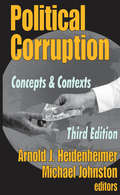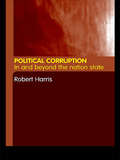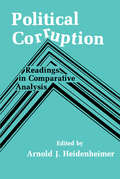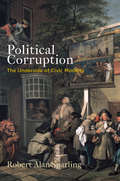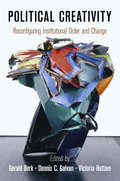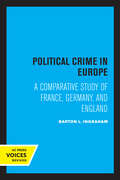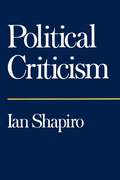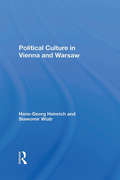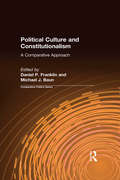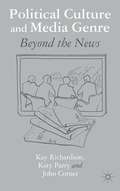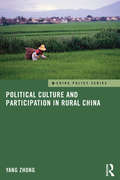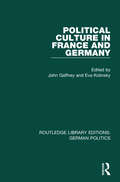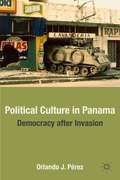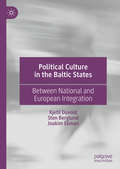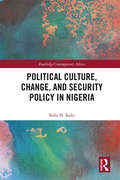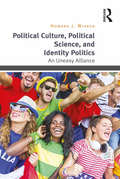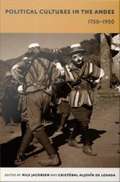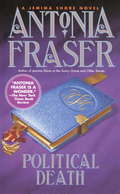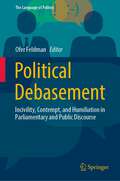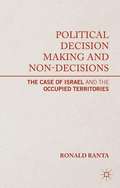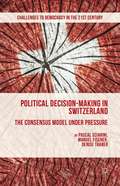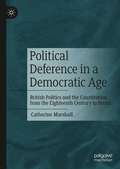- Table View
- List View
Political Corruption: Concepts and Contexts
by Michael Johnston Arnold J. HeidenheimerCorruption is once again high on the international policy agenda as a result of globalization, the spread of democracy, and major scandals and reform initiatives. But the concept itself has been a focus for social scientists for many years, and new findings and data take on richer meanings when viewed in the context of long-term developments and enduring conceptual debates. This compendium, a much-enriched version of a work that has been a standard reference in the field since 1970, offers concepts, cases, and fresh evidence for comparative analysis.Building on a nucleus of classic studies laying out the nature and development of the concept of corruption, the book also incorporates recent work on economic, cultural, and linguistic dimensions of the problem, as well as critical analyses of several approaches to reform. While many authors are political scientists, work by historians, economists, and sociologists are strongly represented. Two-thirds of the nearly fifty articles are based either on studies especially written or translated for this volume, or on selected journal literature published in the 1990s. The tendency to treat corruption as merely a synonym for bribery is illuminated by analyses of the diverse terminology and linguistic techniques that help distinguish corruption problems in the major languages. Recent attempts to measure corruption, and to analyze its causes and effects quantitatively are also critically examined. New contributions emphasize especially: corruption phenomena in Asia and Africa; contrasts among region and regime types; comparing U.S. state corruption incidence; European Party finance and corruption; assessments of international corruption rating project; analyses of international corruption control treaties; unintended consequences of anti-corruption efforts. Cumulatively, the book combines description richness, analytical thrust, conceptual awareness, and contextual articulation.
Political Corruption: In Beyond the Nation State
by Robert HarrisThis book, combining scholarship with readability, shows that political corruption must itself be analysed politically. Spectacularly corrupt politicians - the exception rather than the rule - are usually symptoms, not causes, and much political corruption is simply normal politics taken to excess. But in a world in which anti-corruption strategies themselves are often thinly disguised examples of political corruption, the ways in which political systems address their own corruption are as varied and fascinating in character as crucial to comprehend. A valuable read for anyone studying social science disciplines such as politics, international relations, sociology, anthropology, criminology and public policy. As well as the global community of anti-corruption activists, professional politicians, police, business people and lawyers.
Political Corruption: Readings in Comparative Analysis
by Michael JohnstonCorruption is once again high on the international policy agenda as a result of globalization, the spread of democracy, and major scandals and reform initiatives. But the concept itself has been a focus for social scientists for many years, and new findings and data take on richer meanings when viewed in the context of long-term developments and enduring conceptual debates. This compendium, a much-enriched version of a work that has been a standard reference in the field since 1970, offers concepts, cases, and fresh evidence for comparative analysis.Building on a nucleus of classic studies laying out the nature and development of the concept of corruption, the book also incorporates recent work on economic, cultural, and linguistic dimensions of the problem, as well as critical analyses of several approaches to reform. While many authors are political scientists, work by historians, economists, and sociologists are strongly represented. Two-thirds of the nearly fifty articles are based either on studies especially written or translated for this volume, or on selected journal literature published in the 1990s. The tendency to treat corruption as merely a synonym for bribery is illuminated by analyses of the diverse terminology and linguistic techniques that help distinguish corruption problems in the major languages. Recent attempts to measure corruption, and to analyze its causes and effects quantitatively are also critically examined. New contributions emphasize especially: corruption phenomena in Asia and Africa; contrasts among region and regime types; comparing U.S. state corruption incidence; European Party finance and corruption; assessments of international corruption rating project; analyses of international corruption control treaties; unintended consequences of anti-corruption efforts. Cumulatively, the book combines description richness, analytical thrust, conceptual awareness, and contextual articulation.
Political Corruption: The Underside of Civic Morality (Haney Foundation Series)
by Robert Alan SparlingThe notion of corruption as a problem for politics spans many centuries and political, social, and cultural contexts. But it is incredibly difficult to define what we mean when we describe a regime or actor as corrupt: while corruption suggests a falling away from purity, health, or integrity, it flourishes today in an environment that is often inarticulate about its moral ideals and wary of perfectionist discourse. Providing a historical perspective on the idea, Robert Alan Sparling explores diverse visions of corruption that have been elucidated by thinkers across the modern philosophical tradition.In a series of chronologically ordered philosophical portraits, Political Corruption considers the different ways in which a metaphor of impurity, disease, and dissolution was deployed by political philosophers from the Renaissance to the early twentieth century. Focusing specifically on the thought of Erasmus, Étienne de La Boétie, Machiavelli, Montesquieu, Bolingbroke, Robespierre, Kant, and Weber, Sparling situates these thinkers in their historical contexts and argues that each of them offers a distinctive vision of corruption that has continuing relevance in contemporary political debates. He contrasts immoderate purists with impure moderates and reveals corruption to be a language of reaction and revolution. The book explores themes such as the nature of civic trust and distrust; the relationship of transparency to accountability; the integrity of leaders and the character of uncorrupted citizens; the division between public and private; the nature of dependency; and the relationship between regime and civic disposition.Political Corruption examines how philosophers have conceived of public office and its abuse and how they have sought to insulate the public sphere from anticivic inclinations and interests. Sparling argues that speaking coherently about political corruption in our present moment requires a robust account of the good regime and of the character of its citizens and officeholders.
Political Creativity: Reconfiguring Institutional Order and Change
by Dennis C. Galvan Gerald Berk Victoria HattamPolitical Creativity intervenes in the lively debate currently underway in the social sciences on institutional change. Editors Gerald Berk, Dennis C. Galvan, and Victoria Hattam, along with the contributors to the volume, show how institutions inevitably combine order and change, because formal rules and roles are always available for reconfiguration. Creative action is not the exception but the very process through which all political formations are built, promulgated and changed.Drawing on the rich cache of antidualist theoretical traditions, from poststructuralism and ecological theory to constructivism and pragmatism, a diverse group of scholars probes acts of social innovation in many locations: land boards in Botswana, Russian labor relations, international statistics, global supply chains, Islamic economics in Algeria, Islamic sects and state authority in Senegal, and civil rights reform, colonization, industrial policy, and political consulting in the United States. These political scientists reconceptualize agency as a relational process that continually reorders the nature and meaning of people and things, order as an assemblage that necessitates creative tinkering and interpretation, and change as the unruly politics of time that confounds the conventional ordering of past, present, and future. Political Creativity offers analytical tools for reimagining order and change as entangled processes.Contributors: Stephen Amberg, Chris Ansell, Gerald Berk, Kevin Bruyneel, Dennis C. Galvan, Deborah Harrold, Victoria Hattam, Yoshiko M. Herrera, Gary Herrigel, Joseph Lowndes, Ato Kwamena Onoma, Adam Sheingate, Rudra Sil, Ulrich Voskamp, Volker Wittke.
Political Crime in Europe: A Comparative Study of France, Germany, and England
by Barton L. IngrahamThis title is part of UC Press's Voices Revived program, which commemorates University of California Press’s mission to seek out and cultivate the brightest minds and give them voice, reach, and impact. Drawing on a backlist dating to 1893, Voices Revived makes high-quality, peer-reviewed scholarship accessible once again using print-on-demand technology. This title was originally published in 1979.
Political Criticism
by Ian ShapiroSince the 1960s a resurgence of interest in the moral foundations of politics has fueled debates about the appropriate sources of our political judgments. Ian Shapiro analyzes and advances these debates, discussing them in an accessibly style. He defends a view of politics called critical naturalism as a third way between the neo-Kantian theory of John Rawl's and the contextual arguments of Richard Rorty, Michael Walzer, Alasdair MacIntyre and others. He formulates a new justification for democratic politics and an innovative account of the nature of political argument.
Political Culture In Vienna And Warsaw
by Hans-georg Heinrich Slawomir WiatrThis book presents assumptions about the evolution of a political culture in Vienna and Warsaw and the factors that cause specific patterns of evolution. It explores the secular changes in social structure that are related to changes in cultural normalcy.
Political Culture and Conflict Resolution in the Arab World: Lebanon and Algeria (Islamic Studies Series)
by Benjamin MacQueenBenjamin MacQueen presents an innovative and in-depth look at contemporary conflict resolution in the Arab Middle East, developing a unique theory of political culture through his analysis of peace processes in Lebanon and Algeria. Moving beyond conventional perspectives, Political Culture and Conflict Resolution in the Arab World highlights that while culture can serve as a key to resolving and transforming conflict, if neglected, it can act to worsen the conditions that lead to conflict. This book represents a critical advance in the study of conflict and its resolution in the Arab World. Islamic Studies Series - Volume 3
Political Culture and Constitutionalism: A Comparative Approach (Comparative Politics Ser.)
by Daniel P. Franklin Michael J. BaunThis work is a cross-national examination of the relationship between political culture and constitutionalism. The countries studied include Nigeria, Turkey and Japan. Questions explored include whether constitutions must evolve and whether constitutionalism is only a western concept.
Political Culture and Institutional Development in Costa Rica and Nicaragua
by Consuelo CruzDemocracy's checkered past and uncertain future in the developing world still puzzles and fascinates. In Latin America, attempts to construct resilient democracies have been as pervasive as reversals have been cruel. This book is based on a wealth of original historical documents and contemporary interviews with prominent political actors and analyses five centuries of political history in these paradigmatic cases of outstanding democratic success and abysmal failure. It shows that while factors highlighted by standard explanations matter, it is political culture that configures economic development, institutional choices and political pacts in ways that directly affect both democracy's chances and its quality. But it also claims that political culture is a dynamic combination of rational and normative imperatives that define actors' views of the permissible, shape their sense of realism, structure political struggles and legitimate the resulting distribution of power.
Political Culture and Media Genre
by John Corner Kay Richardson Katy ParryExploring the forms and meanings of mediated politics beyond the news cycle, this book encompasses genres drawn from television, radio, the press and the internet, assessing their individual and collective contribution to contemporary political culture through textual analysis and thematic review.
Political Culture and Participation in Rural China (China Policy Series)
by Yang ZhongDespite China’s rapid urbanisation and industrialisation, most Chinese still live in the vast countryside or have rural household registration. Although there was significant economic improvement in rural areas in the 1980s, the rural economy has been stagnating or deteriorating since then, and the book argues that the rural-urban income gap is giving rise to the potential for political instability throughout China. This book, based on extensive original research including interview fieldwork in rural areas, examines the nature of political culture and participation in rural China, discussing issues such as the support, or lack of it, for democratic values; levels of political interest; the ways in which Chinese peasants interact with village and local officials; subjective factors that motivate them to vote, (or not to vote) in village elections; and rural people’s views on market-oriented economic reforms, local and national government, and the Communist Party. The book argues that although hitherto peasants’ riots, sit-ins and demonstrations have been localised and uncoordinated, they are frequent, and have the potential to cause serious political crises for China’s rulers. It concludes by considering the future political development of China’s vast countryside.
Political Culture in France and Germany: A Contemporary Perspective (Routledge Library Editions: German Politics)
by Eva Kolinsky John GaffneyThis book, originally published in 1991, assesses how attitudes, political orientations and social values changed during the five decades after the Second World War. The case studies in the book focus on key ‘sites’ in political culture: in France, on the extreme right, the cinema, the impact of media personalities and changes of political discourse; in Germany, on the decline of regional identities, the emergence of specific issues and the concern of political parties with the effectiveness of language. This interdisciplinary study provides new insights into the way French and German people see themselves.
Political Culture in Panama
by Orlando J. PérezThe most comprehensive and empirically grounded analysis of the institutional and attitudinal factors that have shaped Panamanian politics since the 1989 U. S. invasion. Panama offers a unique opportunity to understand the long-term effects of United States policy and the challenges of building democracy after a military invasion.
Political Culture in the Baltic States: Between National and European Integration
by Kjetil Duvold Sten Berglund Joakim EkmanThe book is the first systematic and comparative effort to capture political culture in the Baltic countries, including political orientation and support for democracy. Revolving around public opinion data from the 1990s and onwards, including two recent surveys commissioned by the authors, the book takes stock of the political climate prevailing in Estonia, Latvia and Lithuania a quarter of a century after reclaiming independence and fifteen years after becoming members of NATO and the EU. These three countries share the same geopolitical fate and many contemporary challenges, and yet each has been marked by their own transitions and struggles between nation building and European integration, Western and post-Soviet orientations, and past experience and future aspirations.
Political Culture, Change, and Security Policy in Nigeria (Routledge Contemporary Africa)
by Kalu N. KaluDemonstrating how political culture facilitates or distorts political preferences and political outcomes, this book explores how the historical development of social conditions and the current social structures shape understandings and constrain individual and collective actions within the Nigerian political system. Political Culture, Change, and Security Policy examines the extent to which specific norms and socialization processes within the political and civic culture abet corruption or the proclivity to engage in corrupt practices and how they help reinforce political attitudes and civic norms that have the potential to undermine the effectiveness of government. It also delineates specific doctrinal models and strategic framework essential to the development and implementation of Nigeria’s national security policy, as well as innovative approaches to national development planning. Professor Kalu N. Kalu offers an exhaustive study that integrates several quantitative models in addressing a series of theoretical and empirical questions that inform historical and contemporary issues of the Nigerian project. The general premise is that it is not enough to simply highlight the problems of the state and address the what question, we must also address the why and how questions that drive political change, policy preferences, and competing political outcomes.
Political Culture, Political Science, and Identity Politics: An Uneasy Alliance
by Howard J. WiardaPolitical Culture (defined as the values, beliefs, and behavioral patterns underlying the political system) has long had an uneasy relationship with political science. Identity politics is the latest incarnation of this conflict. Everyone agrees that culture and identity are important, specifically political culture, is important in understanding other countries and global regions, but no one agrees how much or how precisely to measure it. In this important book, well known Comparativist, Howard J. Wiarda, traces the long and controversial history of culture studies, and the relations of political culture and identity politics to political science. Under attack from structuralists, institutionalists, Marxists, and dependency writers, Wiarda examines and assesses the reasons for these attacks and why political culture went into decline only to have a new and transcendent renaissance and revival in the writings of Inglehart, Fukuyama, Putnam, Huntington and many others. Today, political culture, now updated to include identity politics, stands as one of these great explanatory paradigms in political science, the others being structuralism and institutionalism. Rather than seeing them as diametrically exposed, Howard Wiarda shows how they may be made complementary and woven together in more complex, multicausal explanations. This book is brief, highly readable, provocative and certain to stimulate discussion. It will be of interest to general readers and as a text in courses in international relations, comparative politics, foreign policy, and Third World studies.
Political Cultures in Asia and Europe: Citizens, States and Societal Values (Politics in Asia)
by Jean Blondel Takashi InoguchiThis book is a study of the attitudes to political and social life among the citizens of eighteen countries in Western Europe, East and Southeast Asia. Drawing on data from the largest cross-national survey on political culture for the last half a century, this book assesses how political culture differs across the two regions and whether this can be drawn back to a profound difference in basic societal values, or ‘Asian values’. Examining geographical, religious and socio-economic factors, the authors discuss whether there genuinely is a common political value in the two regions or a profound difference as these countries move towards modernity. This original and comprehensive study of the values, norms and beliefs held by citizens of the East and West will appeal to students and scholars of political culture and comparative politics, as well as Asian and European politics.
Political Cultures in the Andes 1750-1950
by Nils Jacobsen Cristóbal Aljovín de LosadaA major contribution to debates about Latin American state formation, Political Cultures in the Andes brings together comparative historical studies focused on Colombia, Ecuador, Bolivia, and Peru from the mid-eighteenth century to the mid-twentieth. While highlighting patterns of political discourse and practice common to the entire region, these state-of-the-art histories show how national and local political cultures depended on specific constellations of power, gender and racial orders, processes of identity formation, and socioeconomic and institutional structures. The contributors foreground the struggles over democracy and citizens' rights as well as notions of race, ethnicity, gender, and class that have been at the forefront of political debates and social movements in the Andes since the waning days of the colonial regime some two hundred years ago. Among the many topics they consider are the significance of the Bourbon reform era to subsequent state-formation projects, the role of race and nation in the work of early-twentieth-century Bolivian intellectuals, the fiscal decentralization campaign in Peru following the devastating War of the Pacific in the late nineteenth century, and the negotiation of the rights of "free men of all colors" in Colombia's Atlantic coast region during the late colonial period. Political Cultures in the Andes includes an essay by the noted Mexicanist Alan Knight in which he considers the value and limits of the concept of political culture and a response to Knight's essay by the volume's editors, Nils Jacobsen and Cristbal Aljovn de Losada. This important collection exemplifies the rich potential of a pragmatic political culture approach to deciphering the processes involved in the formation of historical polities. Contributors. Cristbal Aljovn de Losada, Carlos Contreras, Margarita Garrido, Laura Gotkowitz, Aline Helg, Nils Jacobsen, Alan Knight, Brooke Larson, Mary Roldan, Sergio Serulnikov, Charles F. Walker, Derek Williams
Political Death (Jemima Shore #8)
by Antonia FraserWhen the wayward lady Imogen Swain summons journalist Jemima Shore to her home, Jemima once again finds herself in the thick of love affairs--old and new--intrigue, and betrayal. For the colorful Lady Imogen kept diaries documenting her passionate affair with a rising young politician who has since risen to high ranks in the government. Increasingly eccentric as the years have passed, Lady Imogen now threatens to reveal details of the affair, and of the subsequent and unsolved disappearance of a young journalist. Jemima's meeting with Lady Imogen is the first step in a sinister series of events which will remind the reader why Antonia Fraser is the reigning queen of murder--British style!
Political Debasement: Incivility, Contempt, and Humiliation in Parliamentary and Public Discourse (The Language of Politics)
by Ofer FeldmanThis edited book is an innovative collection of studies—pioneering scholarship systematically exploring the various features of debasement language used by political leaders in their speeches, statements, and remarks during parliamentary and other official as well as unofficial, private activities. The book examines in particular the forms, functions, and effects of political debasement in Western and non-Western countries, including Spain, Malaysia, the UK, Japan, China, India, Montenegro, Greece, Poland, and Israel. It addresses the growing interest in recent years in issues related to the increase of debasement in the public sphere. These include high-echelon politicians’ invective and vulgarity toward their colleagues in houses of parliament; their abusive and cynical language toward sections of the public, including women and minorities; and their crude sarcasm and irony expressed toward media representatives. The book focuses on those instances where political leaders at the very highest-level employ debasement discourse; it identifies the specific language they use in different political cultures and under different situations; the reasons for using this type of language; and its consequences. The book brings together a team of distinguished political scientists, communication and linguistics researchers, and social and political psychologists, with expert backgrounds and experience in understanding the reciprocal interaction between language and politics, in this case: debasement. They discuss and provide a number of novel insights of theoretical and practical importance regarding debasing discourse, as well as potential avenues for future research on the nature and effect of this type of language.
Political Decision Making and Non-Decisions
by Ronald RantaThis book examines Israel's relationship and political decision-making process towards the Occupied Territories from the aftermath of the Six Day War to the Labour Party's electoral defeat in 1977. The period represents the first decade of Israel's occupation of the Occupied Territories and the last decade in which the Labour Party was Israel's most dominant political force. Arguing that the successive Israeli governments headed by the Labour Party lacked a strategic policy towards the Occupied Territories to address the country's objectives and needs, this book demonstrates the detrimental effect this had on Israel, on the Middle East in general, and on the Palestinian people in particular. In addressing key aspects of decision making pathologies, this book raises issues which remain important features of Israeli politics today and an analysis relevant for political decision making worldwide.
Political Decision-Making in Switzerland
by Manuel Fischer Pascal Sciarini Denise TraberThe Swiss consensus democracy model has been – and remains – under pressure. While being a non-EU member, Switzerland is heavily influenced by European integration and exemplifies some of the crucial changes at work on the continent. Based on a rich collection of data covering the 11 most important Swiss decision-making processes in recent years, this book highlights these changes and related variations across policy domains. It examines Europeanization as a major driving factor in the strengthening of bureaucratic policy-making, and charts the decline of corporatist policy-making and reinforcement of partisan politics as a result of institutional reforms, mediatization, higher polarization among social partners and the rise of a populist right wing party. Switzerland has moved away from the ideal-type of consensus. Coalitions have become more unstable and policy outputs less predictable, yet this may be good news in terms of innovation.
Political Deference in a Democratic Age: British Politics and the Constitution from the Eighteenth Century to Brexit
by Catherine MarshallThis book explores the concept of deference as used by historians and political scientists. Often confused and judged to be outdated, it shows how deference remains central to understanding British politics to the present day. This study aims to make sense of how political deference has functioned in different periods and how it has played a crucial role in legitimising British politics. It shows how deference sustained what are essentially English institutions, those which dominated the Union well into the second half of the twentieth century until the post-1997 constitutional transformations under New Labour. While many dismiss political and institutional deference as having died out, this book argues that a number of recent political decisions – including the vote in favour of Brexit in June 2016 – are the result of a deferential way of thinking that has persisted through the democratic changes of the twentieth century. Combining close readings of theoretical texts with analyses of specific legal changes and historical events, the book charts the development of deference from the eighteenth century through to the present day. Rather than offering a comprehensive history of deference, it picks out key moments that show the changing nature of deference, both as a concept and as a political force.
